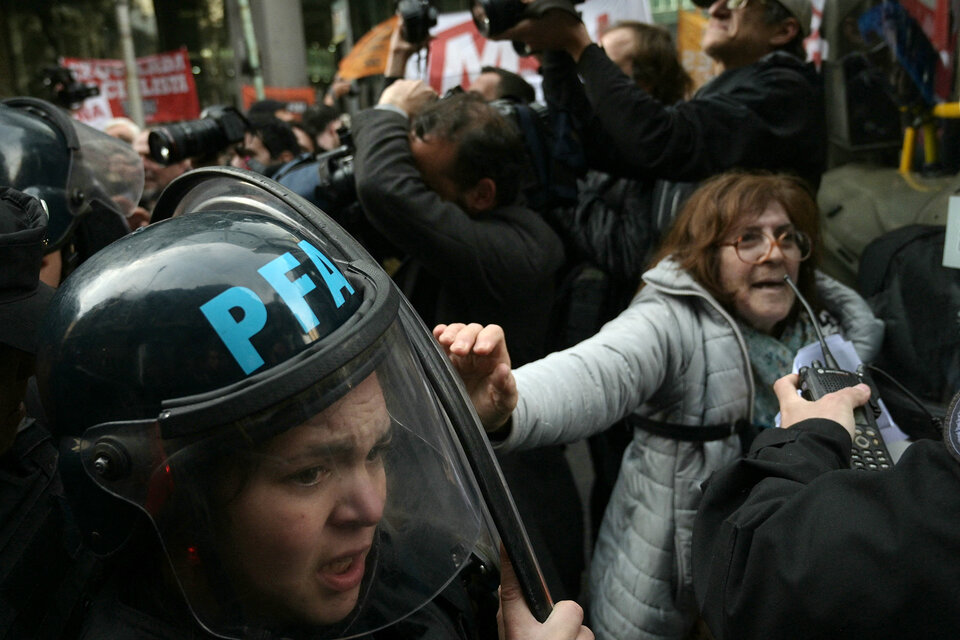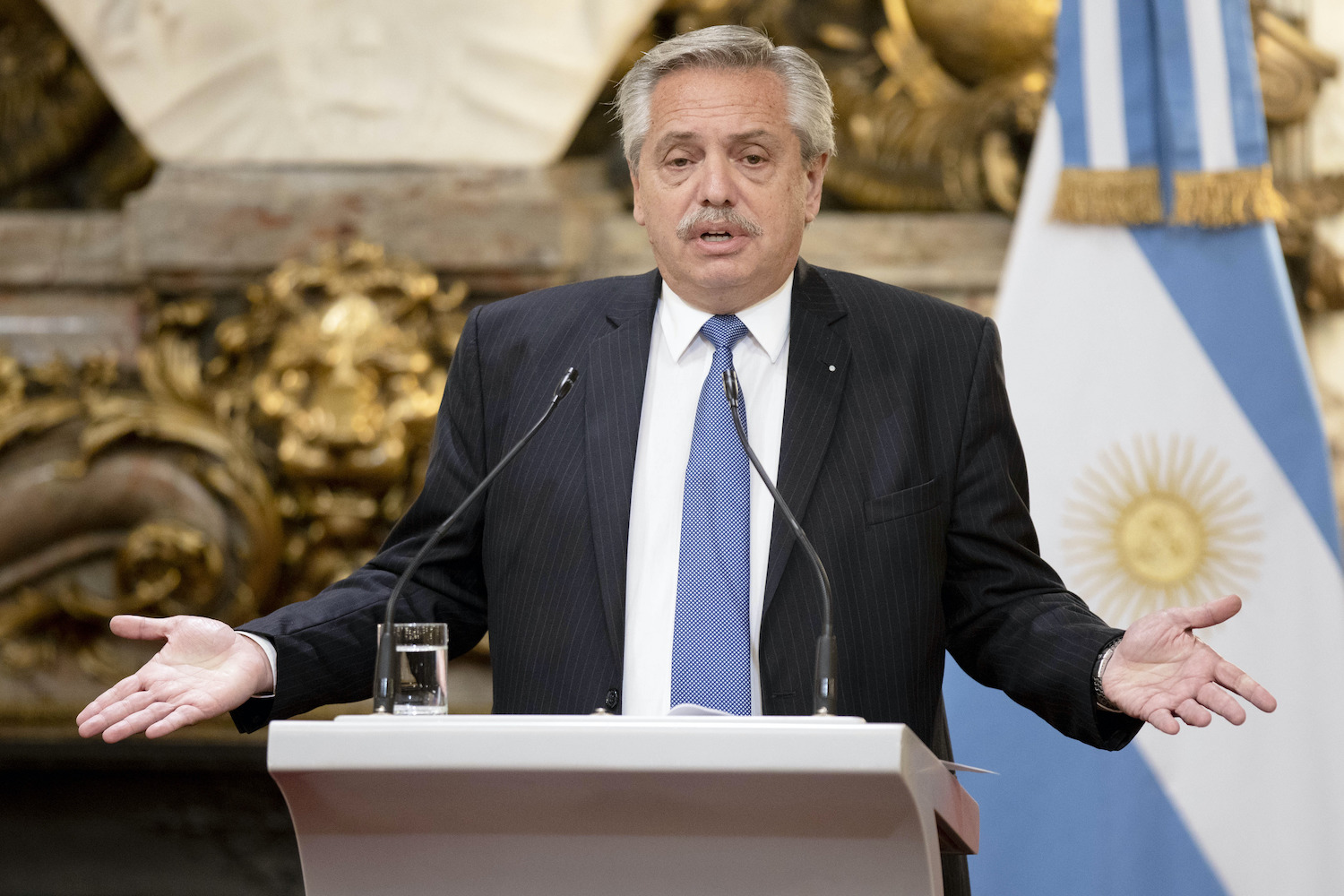Instabilities in a denialist Argentina
Aram Aharonian
Argentina is today overpopulated with instabilities that seem to have come to stay, hand in hand with the serious economic and social crisis after eight months of government of the ultra-right-wing Javier Milei, who “sold himself” as a prophet of a new economic, political and cultural time. Today it is difficult to maintain that image of pathetic arrogance with a symbolic ego-chainsaw in hand.
Pathetic demonstration of the government, evicting on Wednesday with tear gas and sticks the protest of retirees who returned to demonstrate because they cannot make ends meet and in rejection of the imminent veto of Javier Milei to the law of pension mobility. Dozens of retirees with their eyes affected by pepper spray. They have yet to be accused of being terrorists?

Sometimes it is easier to describe the current Argentine politics as a soap opera than to try to make any analysis. The endless disputes within Javier Milei’s pro-government and ultra-right-wing La Libertad Avanza, the clashes of this group with the neoliberal ex-president Mauricio Macri, and the internal conflicts of the party he leads, Propuesta Republicana (PRO), add to the legislative defeats of the ruling party.
At the beginning of the week, Macri returned to the presidential residence to reiterate a list of claims he has against La Libertad Avanza. “He wants positions and boxes”, denounce from the Presidency. Macri wants the head of the president of the Chamber of Deputies, Martín Menem, to put Cristian Ritondo in his place. Menem’s answer was concise: “we are not going to give him up”. In search of the lost protagonism, he will lead a meeting with governors and leaders for the re-launching of his Fundación Pensar.
The great international financial capital and the great vernacular businessmen share the essential objectives of Milei’s government, but the fragility of the political regime and the decadence of its parties, combined with the social crisis and the “dead end” of the economy show a serious situation.

The doubts are about the “political volume” to lead the crisis. Milei is going through a moment of weakness that makes Macri dare to practice his moves of rapprochement (for some) or co-optation (for others), which may induce him to be imitated by more actors of the vernacular right. Meanwhile, the political opposition does not manage to get out of the depression and seems to have run out of ideas and fuel.
Javier Milei’s entourage blamed Vice President Victoria Villarruel for the scandal that broke out with the visit of six deputies to the genocides who are imprisoned in the Ezeiza prison. They attributed to her that the freedom of the criminals of the last dictatorship was “her agenda” and not that of Milei.
But Villarruel was not intimidated by the criticisms of his own space and in an act in the Senate, he announced that he would seek to reopen all the cases against the militants of the 70’s, that is, the few who survived the concentration camps or the death flights carried out by the repressors of the civil-military dictatorship whom he visited in prison. The human rights movement denounced that, once again, Villarruel made a vindication and apology of State terrorism.
The president of the Grandmothers of Plaza de Mayo, Estela de Carlotto, said: “We are always waking up with bad news, because I really do not know what else they want, if they could kill us they would kill not only those who have survived but also our relatives”, she said.

Carlotto said that the situation “is taking a very strange color, very ugly and unpleasant for the division of the Argentine society, because to implant hatred in reverse, that is to say, that the victims were those who left 30,000 people dead and also disappeared and the theft of babies and property”.
Iara Fabstein points out in Anfibia magazine that the old working people, crucial actor of the political imaginary of the second half of the 20th century, no longer exists and the protagonist of these times is an individual traversed by neoliberal subjectivity. Peronism does not seem capable of identifying a new political subject and imagining possible futures. Those who felt challenged and contained by Peronism are no longer there. Neither the party nor the national and popular movement seem to have anything to say to them.
The right wing wakes up
It is that for months the ruling classes, in their own interest in the application of measures and laws, feigned autism, letting a government with extreme institutional weakness (minority in both chambers of the National Congress and no governor of its own) to carry out the “biggest adjustment in history”, while the foreign debt crisis appears again as a critical event, finding the Central Bank with negative reserves.
There is nervousness in the libertarian ranks, because the “certain” triumph of Donald Trump in the US elections is much less certain than a month ago. Reality placed the government in a much more uncomfortable agenda than that of the scandals of former President Alberto Fernandez and the deep crisis of Peronism.

The government suffered three consecutive and high impact defeats in the legislative field: it lost the appointment of the authorities of the Bicameral Commission that controls the intelligence agencies; it suffered the rejection of the Necessity and Urgency Decree (DNU) that sought to allocate some 100 million dollars to reserved expenses of the State Intelligence Secretariat (SIDE) and finally the Senate approved an increase -albeit limited- for the retirement benefits.
Nervous and obfuscated, Milei anticipated that he will veto the increase for senior citizens, leaving open a dispute to see if the National Congress will revert this presidential decision or not.
Several centuries ago, Machiavelli warned “that there is nothing more difficult to deal with, nor in which success is more doubtful, than to become responsible for the introduction of a new political order (…) It is convenient to analyze if these innovators have their own strength or if they depend on others; that is, if they have to beg or if they can force to carry out their work”.
In his short presidential term, navigating in his own weakness, Milei was forced to make multiple concessions to deputies and senators in order to give birth to the Bases Law. Furious for the recent parliamentary defeats, he is going through a difficult uncertainty, and does not seem to be in a position to impose.
A nervous top and a bottom that begins to move.
*Uruguayan journalist and communicologist. Master in Integration. Creator and founder of Telesur. President of the Foundation for Latin American Integration (FILA) and director of the Latin American Center for Strategic Analysis (CLAE).
